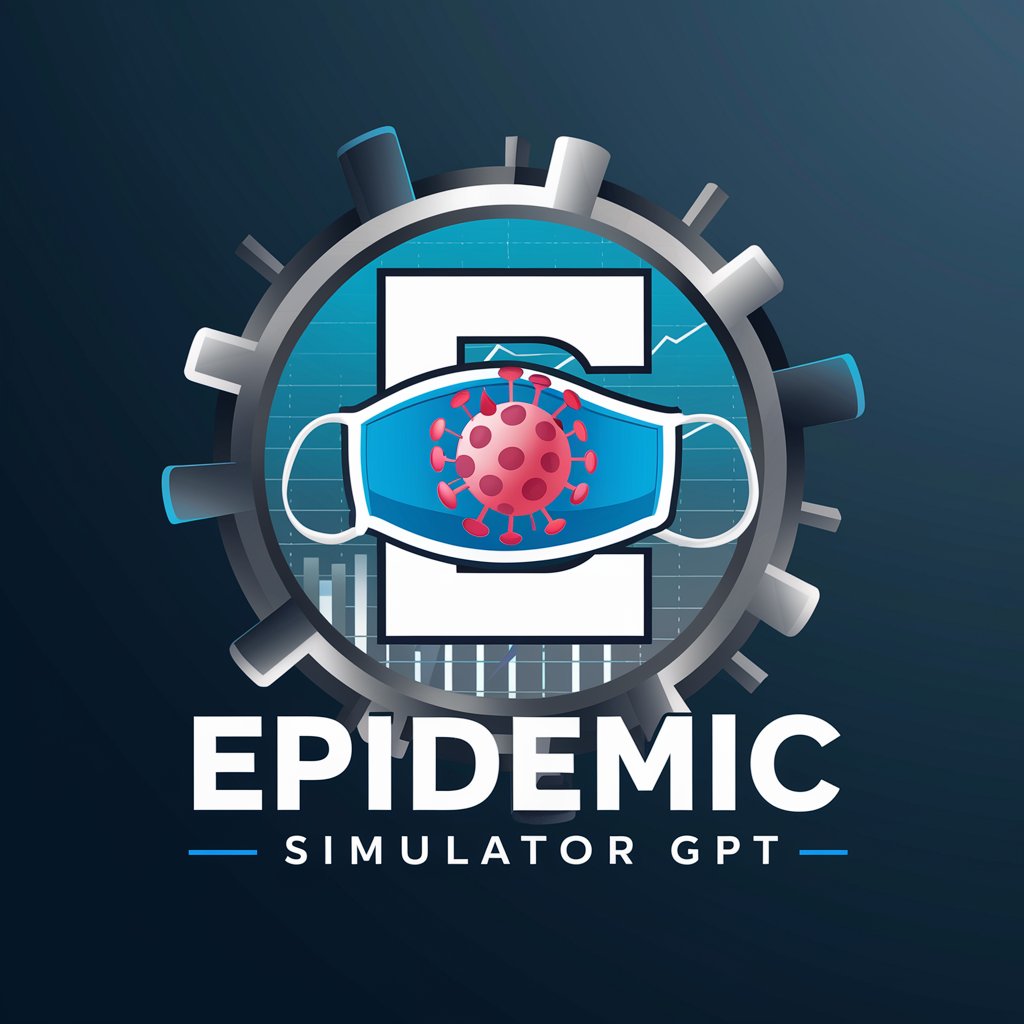Epidemic Simulator GPT - Epidemic Analysis & Prediction

Welcome! Let's model epidemic scenarios together.
Simulate and predict epidemic outcomes with AI.
Analyze the potential impact of a new vaccination program on an ongoing epidemic...
Simulate the spread of a disease in a densely populated urban area with minimal intervention...
Evaluate the effectiveness of social distancing measures in reducing infection rates in a community...
Predict the number of hospitalizations and deaths in a scenario where quarantine measures are strictly enforced...
Get Embed Code
Epidemic Simulator GPT: An Overview
Epidemic Simulator GPT is a specialized AI tool designed for simulating, predicting, and analyzing the dynamics of epidemic spread within populations. It leverages data on disease characteristics, population demographics, and intervention strategies to model potential epidemic scenarios. The purpose behind its design is to aid in the understanding of how infectious diseases spread, the impact of public health interventions, and to forecast potential outcomes of epidemics. For example, it can simulate the spread of a novel influenza virus in a city, taking into account factors such as the basic reproduction number (R0), incubation period, and the effectiveness of interventions like vaccination campaigns and social distancing measures. This simulation helps in visualizing the potential spread over time, estimating the number of infected individuals, and assessing the healthcare system's burden. Powered by ChatGPT-4o。

Core Functions of Epidemic Simulator GPT
Data Analysis
Example
Analyzing COVID-19 case data to identify trends in transmission and outbreak patterns.
Scenario
Public health officials use this function to analyze infection rates and demographics data to tailor response strategies effectively.
Simulation
Example
Simulating the impact of a new vaccination program on the spread of measles in a school district.
Scenario
Educational institutions and health authorities can estimate the effectiveness of vaccination mandates in preventing outbreaks among students.
Intervention Evaluation
Example
Evaluating the potential reduction in transmission with the implementation of mask mandates and lockdowns during a flu pandemic.
Scenario
Government agencies assess different public health policies to determine the most effective measures for controlling the spread of the virus.
Outcome Prediction
Example
Predicting the number of hospitalizations and deaths from an Ebola outbreak in a rural area with limited healthcare resources.
Scenario
Non-governmental organizations (NGOs) and healthcare planners use this to allocate resources efficiently and prepare for potential healthcare demands.
Target Users of Epidemic Simulator GPT
Public Health Officials
This group includes epidemiologists, health policy makers, and other public health professionals who are responsible for monitoring disease spread, implementing control measures, and planning public health responses. They benefit from using Epidemic Simulator GPT by gaining insights into effective intervention strategies and forecasting outbreak trends.
Researchers and Academics
Scientists and students studying epidemiology, infectious diseases, public health, and related fields use the tool for educational purposes, hypothesis testing, and conducting research on disease dynamics and intervention outcomes.
Healthcare Planners and NGOs
Organizations involved in healthcare delivery and crisis response, including hospitals, NGOs, and international health agencies, utilize the simulator to prepare for and manage the impact of infectious disease outbreaks on healthcare systems and communities.
General Public
While not the primary audience, interested members of the public can use the simulator to understand the potential impact of public health decisions and personal behavior on the spread of diseases.

How to Use Epidemic Simulator GPT
1
Visit yeschat.ai to start exploring Epidemic Simulator GPT with a free trial, no login or ChatGPT Plus subscription required.
2
Provide detailed information about the epidemic scenario you are interested in, including disease characteristics, population demographics, and potential interventions.
3
Specify the type of simulation or analysis you need, whether it's predicting the spread of a disease, evaluating intervention strategies, or estimating potential outcomes.
4
Use the provided output to analyze epidemic trends, assess the effectiveness of interventions, and make informed decisions or further inquiries.
5
For optimal results, provide as much relevant data as possible and consider running multiple simulations with different parameters to explore various scenarios.
Try other advanced and practical GPTs
公文写作大师
Effortlessly Craft Formal Documents with AI

Action Game Design Ace
Crafting Thrilling Action Games with AI

2nd Order Effect GPT
Unlock the Hidden Impacts of Your Decisions

Agent Fabricator
Empowering MVP creation with AI innovation

GPT 学人工智能
Empowering AI Learning and Creativity

Buildwell AI - UK Building Assistant
Navigating Construction Compliance with AI Power

AP Microeconomics Professor
Master Economics with AI-Powered Insights

Hyrule Villager
Explore Hyrule with AI-powered guidance.

AnyCourse Tutor
Empowering Learning with AI

AI Book Finder
Discover Books with AI Precision

PromptMaster AI
Enhancing AI Interactions with Expert Prompt Engineering

VisionCraft HTML Design
Crafting Visuals with AI Precision

Frequently Asked Questions about Epidemic Simulator GPT
What is Epidemic Simulator GPT?
Epidemic Simulator GPT is an AI-powered tool designed to simulate and predict the dynamics of epidemic spread, evaluate intervention strategies, and estimate outcomes based on user-provided data.
Can Epidemic Simulator GPT model any type of epidemic?
Yes, it can model a wide range of epidemics, given sufficient data on the disease's characteristics, transmission dynamics, and population demographics.
How accurate are the predictions made by the simulator?
The accuracy depends on the quality and amount of data provided. While the simulator uses sophisticated modeling techniques, predictions should be considered as estimates and not absolute certainties.
Can it simulate the impact of multiple interventions simultaneously?
Yes, the simulator can evaluate the combined effects of various interventions, such as vaccination, social distancing, and quarantine measures, on epidemic outcomes.
How can public health officials use this tool?
Public health officials can use it to assess potential epidemic scenarios, plan and optimize intervention strategies, and inform policy decisions based on simulated outcomes.
